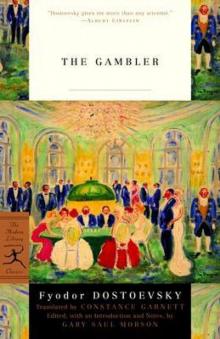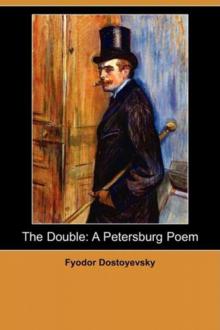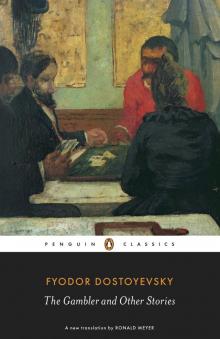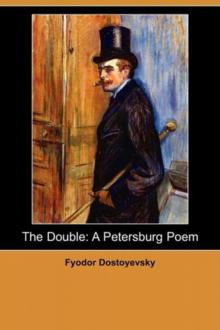- Home
- Fyodor Dostoyevsky
Poor Folk Anthology Page 43
Poor Folk Anthology Read online
Page 43
I turned away with disgust; I was no longer reasoning coldly. I began to feel myself what I was saying and warmed to the subject. I was already longing to expound the cherished ideas I had brooded over in my corner. Something suddenly flared up in me. An object had appeared before me.
"Never mind my being here, I am not an example for you. I am, perhaps, worse than you are. I was drunk when I came here, though," I hastened, however, to say in self-defence. "Besides, a man is no example for a woman. It's a different thing. I may degrade and defile myself, but I am not anyone's slave. I come and go, and that's an end of it. I shake it off, and I am a different man. But you are a slave from the start. Yes, a slave! You give up everything, your whole freedom. If you want to break your chains afterwards, you won't be able to; you will be more and more fast in the snares. It is an accursed bondage. I know it. I won't speak of anything else, maybe you won't understand, but tell me: no doubt you are in debt to your madam? There, you see," I added, though she made no answer, but only listened in silence, entirely absorbed, "that's a bondage for you! You will never buy your freedom. They will see to that. It's like selling your soul to the devil … . And besides … perhaps, I too, am just as unlucky—how do you know—and wallow in the mud on purpose, out of misery? You know, men take to drink from grief; well, maybe I am here from grief. Come, tell me, what is there good here? Here you and I … came together … just now and did not say one word to one another all the time, and it was only afterwards you began staring at me like a wild creature, and I at you. Is that loving? Is that how one human being should meet another? It's hideous, that's what it is!"
"Yes!" she assented sharply and hurriedly.
I was positively astounded by the promptitude of this "Yes." So the same thought may have been straying through her mind when she was staring at me just before. So she, too, was capable of certain thoughts? "Damn it all, this was interesting, this was a point of likeness!" I thought, almost rubbing my hands. And indeed it's easy to turn a young soul like that!
It was the exercise of my power that attracted me most.
She turned her head nearer to me, and it seemed to me in the darkness that she propped herself on her arm. Perhaps she was scrutinising me. How I regretted that I could not see her eyes. I heard her deep breathing.
"Why have you come here?" I asked her, with a note of authority already in my voice.
"Oh, I don't know."
"But how nice it would be to be living in your father's house! It's warm and free; you have a home of your own."
"But what if it's worse than this?"
"I must take the right tone," flashed through my mind. "I may not get far with sentimentality." But it was only a momentary thought. I swear she really did interest me. Besides, I was exhausted and moody. And cunning so easily goes hand-in-hand with feeling.
"Who denies it!" I hastened to answer. "Anything may happen. I am convinced that someone has wronged you, and that you are more sinned against than sinning. Of course, I know nothing of your story, but it's not likely a girl like you has come here of her own inclination … ."
"A girl like me?" she whispered, hardly audibly; but I heard it.
Damn it all, I was flattering her. That was horrid. But perhaps it was a good thing … . She was silent.
"See, Liza, I will tell you about myself. If I had had a home from childhood, I shouldn't be what I am now. I often think that. However bad it may be at home, anyway they are your father and mother, and not enemies, strangers. Once a year at least, they'll show their love of you. Anyway, you know you are at home. I grew up without a home; and perhaps that's why I've turned so … unfeeling."
I waited again. "Perhaps she doesn't understand," I thought, "and, indeed, it is absurd—it's moralising."
"If I were a father and had a daughter, I believe I should love my daughter more than my sons, really," I began indirectly, as though talking of something else, to distract her attention. I must confess I blushed.
"Why so?" she asked.
Ah! so she was listening!
"I don't know, Liza. I knew a father who was a stern, austere man, but used to go down on his knees to his daughter, used to kiss her hands, her feet, he couldn't make enough of her, really. When she danced at parties he used to stand for five hours at a stretch, gazing at her. He was mad over her: I understand that! She would fall asleep tired at night, and he would wake to kiss her in her sleep and make the sign of the cross over her. He would go about in a dirty old coat, he was stingy to everyone else, but would spend his last penny for her, giving her expensive presents, and it was his greatest delight when she was pleased with what he gave her. Fathers always love their daughters more than the mothers do. Some girls live happily at home! And I believe I should never let my daughters marry."
"What next?" she said, with a faint smile.
"I should be jealous, I really should. To think that she should kiss anyone else! That she should love a stranger more than her father! It's painful to imagine it. Of course, that's all nonsense, of course every father would be reasonable at last. But I believe before I should let her marry, I should worry myself to death; I should find fault with all her suitors. But I should end by letting her marry whom she herself loved. The one whom the daughter loves always seems the worst to the father, you know. That is always so. So many family troubles come from that."
"Some are glad to sell their daughters, rather than marrying them honourably."
Ah, so that was it!
"Such a thing, Liza, happens in those accursed families in which there is neither love nor God," I retorted warmly, "and where there is no love, there is no sense either. There are such families, it's true, but I am not speaking of them. You must have seen wickedness in your own family, if you talk like that. Truly, you must have been unlucky. H'm! … that sort of thing mostly comes about through poverty."
"And is it any better with the gentry? Even among the poor, honest people who live happily?"
"H'm … yes. Perhaps. Another thing, Liza, man is fond of reckoning up his troubles, but does not count his joys. If he counted them up as he ought, he would see that every lot has enough happiness provided for it. And what if all goes well with the family, if the blessing of God is upon it, if the husband is a good one, loves you, cherishes you, never leaves you! There is happiness in such a family! Even sometimes there is happiness in the midst of sorrow; and indeed sorrow is everywhere. If you marry YOU WILL FIND OUT FOR YOURSELF. But think of the first years of married life with one you love: what happiness, what happiness there sometimes is in it! And indeed it's the ordinary thing. In those early days even quarrels with one's husband end happily. Some women get up quarrels with their husbands just because they love them. Indeed, I knew a woman like that: she seemed to say that because she loved him, she would torment him and make him feel it. You know that you may torment a man on purpose through love. Women are particularly given to that, thinking to themselves 'I will love him so, I will make so much of him afterwards, that it's no sin to torment him a little now.' And all in the house rejoice in the sight of you, and you are happy and gay and peaceful and honourable … . Then there are some women who are jealous. If he went off anywhere—I knew one such woman, she couldn't restrain herself, but would jump up at night and run off on the sly to find out where he was, whether he was with some other woman. That's a pity. And the woman knows herself it's wrong, and her heart fails her and she suffers, but she loves—it's all through love. And how sweet it is to make up after quarrels, to own herself in the wrong or to forgive him! And they both are so happy all at once—as though they had met anew, been married over again; as though their love had begun afresh. And no one, no one should know what passes between husband and wife if they love one another. And whatever quarrels there may be between them they ought not to call in their own mother to judge between them and tell tales of one another. They are their own judges. Love is a holy mystery and ought to be hidden from all other eyes, whatever happens. That makes it holier and
better. They respect one another more, and much is built on respect. And if once there has been love, if they have been married for love, why should love pass away? Surely one can keep it! It is rare that one cannot keep it. And if the husband is kind and straightforward, why should not love last? The first phase of married love will pass, it is true, but then there will come a love that is better still. Then there will be the union of souls, they will have everything in common, there will be no secrets between them. And once they have children, the most difficult times will seem to them happy, so long as there is love and courage. Even toil will be a joy, you may deny yourself bread for your children and even that will be a joy, They will love you for it afterwards; so you are laying by for your future. As the children grow up you feel that you are an example, a support for them; that even after you die your children will always keep your thoughts and feelings, because they have received them from you, they will take on your semblance and likeness. So you see this is a great duty. How can it fail to draw the father and mother nearer? People say it's a trial to have children. Who says that? It is heavenly happiness! Are you fond of little children, Liza? I am awfully fond of them. You know—a little rosy baby boy at your bosom, and what husband's heart is not touched, seeing his wife nursing his child! A plump little rosy baby, sprawling and snuggling, chubby little hands and feet, clean tiny little nails, so tiny that it makes one laugh to look at them; eyes that look as if they understand everything. And while it sucks it clutches at your bosom with its little hand, plays. When its father comes up, the child tears itself away from the bosom, flings itself back, looks at its father, laughs, as though it were fearfully funny, and falls to sucking again. Or it will bite its mother's breast when its little teeth are coming, while it looks sideways at her with its little eyes as though to say, 'Look, I am biting!' Is not all that happiness when they are the three together, husband, wife and child? One can forgive a great deal for the sake of such moments. Yes, Liza, one must first learn to live oneself before one blames others!"
"It's by pictures, pictures like that one must get at you," I thought to myself, though I did speak with real feeling, and all at once I flushed crimson. "What if she were suddenly to burst out laughing, what should I do then?" That idea drove me to fury. Towards the end of my speech I really was excited, and now my vanity was somehow wounded. The silence continued. I almost nudged her.
"Why are you—" she began and stopped. But I understood: there was a quiver of something different in her voice, not abrupt, harsh and unyielding as before, but something soft and shamefaced, so shamefaced that I suddenly felt ashamed and guilty.
"What?" I asked, with tender curiosity.
"Why, you … "
"What?"
"Why, you … speak somehow like a book," she said, and again there was a note of irony in her voice.
That remark sent a pang to my heart. It was not what I was expecting.
I did not understand that she was hiding her feelings under irony, that this is usually the last refuge of modest and chaste-souled people when the privacy of their soul is coarsely and intrusively invaded, and that their pride makes them refuse to surrender till the last moment and shrink from giving expression to their feelings before you. I ought to have guessed the truth from the timidity with which she had repeatedly approached her sarcasm, only bringing herself to utter it at last with an effort. But I did not guess, and an evil feeling took possession of me.
"Wait a bit!" I thought.
Chapter 7
"Oh, hush, Liza! How can you talk about being like a book, when it makes even me, an outsider, feel sick? Though I don't look at it as an outsider, for, indeed, it touches me to the heart … . Is it possible, is it possible that you do not feel sick at being here yourself? Evidently habit does wonders! God knows what habit can do with anyone. Can you seriously think that you will never grow old, that you will always be good- looking, and that they will keep you here for ever and ever? I say nothing of the loathsomeness of the life here … . Though let me tell you this about it—about your present life, I mean; here though you are young now, attractive, nice, with soul and feeling, yet you know as soon as I came to myself just now I felt at once sick at being here with you! One can only come here when one is drunk. But if you were anywhere else, living as good people live, I should perhaps be more than attracted by you, should fall in love with you, should be glad of a look from you, let alone a word; I should hang about your door, should go down on my knees to you, should look upon you as my betrothed and think it an honour to be allowed to. I should not dare to have an impure thought about you. But here, you see, I know that I have only to whistle and you have to come with me whether you like it or not. I don't consult your wishes, but you mine. The lowest labourer hires himself as a workman, but he doesn't make a slave of himself altogether; besides, he knows that he will be free again presently. But when are you free? Only think what you are giving up here? What is it you are making a slave of? It is your soul, together with your body; you are selling your soul which you have no right to dispose of! You give your love to be outraged by every drunkard! Love! But that's everything, you know, it's a priceless diamond, it's a maiden's treasure, love—why, a man would be ready to give his soul, to face death to gain that love. But how much is your love worth now? You are sold, all of you, body and soul, and there is no need to strive for love when you can have everything without love. And you know there is no greater insult to a girl than that, do you understand? To be sure, I have heard that they comfort you, poor fools, they let you have lovers of your own here. But you know that's simply a farce, that's simply a sham, it's just laughing at you, and you are taken in by it! Why, do you suppose he really loves you, that lover of yours? I don't believe it. How can he love you when he knows you may be called away from him any minute? He would be a low fellow if he did! Will he have a grain of respect for you? What have you in common with him? He laughs at you and robs you—that is all his love amounts to! You are lucky if he does not beat you. Very likely he does beat you, too. Ask him, if you have got one, whether he will marry you. He will laugh in your face, if he doesn't spit in it or give you a blow—though maybe he is not worth a bad halfpenny himself. And for what have you ruined your life, if you come to think of it? For the coffee they give you to drink and the plentiful meals? But with what object are they feeding you up? An honest girl couldn't swallow the food, for she would know what she was being fed for. You are in debt here, and, of course, you will always be in debt, and you will go on in debt to the end, till the visitors here begin to scorn you. And that will soon happen, don't rely upon your youth—all that flies by express train here, you know. You will be kicked out. And not simply kicked out; long before that she'll begin nagging at you, scolding you, abusing you, as though you had not sacrificed your health for her, had not thrown away your youth and your soul for her benefit, but as though you had ruined her, beggared her, robbed her. And don't expect anyone to take your part: the others, your companions, will attack you, too, win her favour, for all are in slavery here, and have lost all conscience and pity here long ago. They have become utterly vile, and nothing on earth is viler, more loathsome, and more insulting than their abuse. And you are laying down everything here, unconditionally, youth and health and beauty and hope, and at twenty-two you will look like a woman of five-and-thirty, and you will be lucky if you are not diseased, pray to God for that! No doubt you are thinking now that you have a gay time and no work to do! Yet there is no work harder or more dreadful in the world or ever has been. One would think that the heart alone would be worn out with tears. And you won't dare to say a word, not half a word when they drive you away from here; you will go away as though you were to blame. You will change to another house, then to a third, then somewhere else, till you come down at last to the Haymarket. There you will be beaten at every turn; that is good manners there, the visitors don't know how to be friendly without beating you. You don't believe that it is so hateful there? Go and look for yourself som
e time, you can see with your own eyes. Once, one New Year's Day, I saw a woman at a door. They had turned her out as a joke, to give her a taste of the frost because she had been crying so much, and they shut the door behind her. At nine o'clock in the morning she was already quite drunk, dishevelled, half-naked, covered with bruises, her face was powdered, but she had a black-eye, blood was trickling from her nose and her teeth; some cabman had just given her a drubbing. She was sitting on the stone steps, a salt fish of some sort was in her hand; she was crying, wailing something about her luck and beating with the fish on the steps, and cabmen and drunken soldiers were crowding in the doorway taunting her. You don't believe that you will ever be like that? I should be sorry to believe it, too, but how do you know; maybe ten years, eight years ago that very woman with the salt fish came here fresh as a cherub, innocent, pure, knowing no evil, blushing at every word. Perhaps she was like you, proud, ready to take offence, not like the others; perhaps she looked like a queen, and knew what happiness was in store for the man who should love her and whom she should love. Do you see how it ended? And what if at that very minute when she was beating on the filthy steps with that fish, drunken and dishevelled—what if at that very minute she recalled the pure early days in her father's house, when she used to go to school and the neighbour's son watched for her on the way, declaring that he would love her as long as he lived, that he would devote his life to her, and when they vowed to love one another for ever and be married as soon as they were grown up! No, Liza, it would be happy for you if you were to die soon of consumption in some corner, in some cellar like that woman just now. In the hospital, do you say? You will be lucky if they take you, but what if you are still of use to the madam here? Consumption is a queer disease, it is not like fever. The patient goes on hoping till the last minute and says he is all right. He deludes himself And that just suits your madam. Don't doubt it, that's how it is; you have sold your soul, and what is more you owe money, so you daren't say a word. But when you are dying, all will abandon you, all will turn away from you, for then there will be nothing to get from you. What's more, they will reproach you for cumbering the place, for being so long over dying. However you beg you won't get a drink of water without abuse: 'Whenever are you going off, you nasty hussy, you won't let us sleep with your moaning, you make the gentlemen sick.' That's true, I have heard such things said myself. They will thrust you dying into the filthiest corner in the cellar—in the damp and darkness; what will your thoughts be, lying there alone? When you die, strange hands will lay you out, with grumbling and impatience; no one will bless you, no one will sigh for you, they only want to get rid of you as soon as may be; they will buy a coffin, take you to the grave as they did that poor woman today, and celebrate your memory at the tavern. In the grave, sleet, filth, wet snow— no need to put themselves out for you—'Let her down, Vanuha; it's just like her luck—even here, she is head-foremost, the hussy. Shorten the cord, you rascal.' 'It's all right as it is.' 'All right, is it? Why, she's on her side! She was a fellow-creature, after all! But, never mind, throw the earth on her.' And they won't care to waste much time quarrelling over you. They will scatter the wet blue clay as quick as they can and go off to the tavern … and there your memory on earth will end; other women have children to go to their graves, fathers, husbands. While for you neither tear, nor sigh, nor remembrance; no one in the whole world will ever come to you, your name will vanish from the face of the earth—as though you had never existed, never been born at all! Nothing but filth and mud, however you knock at your coffin lid at night, when the dead arise, however you cry: 'Let me out, kind people, to live in the light of day! My life was no life at all; my life has been thrown away like a dish- clout; it was drunk away in the tavern at the Haymarket; let me out, kind people, to live in the world again.'"

 The Eternal Husband
The Eternal Husband Crime and Punishment
Crime and Punishment The Brothers Karamazov
The Brothers Karamazov Notes From Underground
Notes From Underground The Idiot
The Idiot Netochka Nezvanova (Penguin ed.)
Netochka Nezvanova (Penguin ed.) The Gambler
The Gambler The Double
The Double Poor Folk Anthology
Poor Folk Anthology The Gambler and Other Stories (Penguin ed.)
The Gambler and Other Stories (Penguin ed.) Prestuplenie i nakazanie. English
Prestuplenie i nakazanie. English Notes from the Underground
Notes from the Underground The Double: A Petersburg Poem
The Double: A Petersburg Poem White Nights and Other Stories / The Novels of Fyodor Dostoevsky, Volume X
White Nights and Other Stories / The Novels of Fyodor Dostoevsky, Volume X Complete Works of Fyodor Dostoyevsky
Complete Works of Fyodor Dostoyevsky Poor Folk and Other Stories
Poor Folk and Other Stories The House of the Dead
The House of the Dead